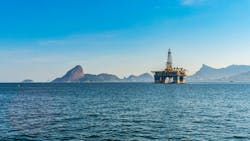Opinion: Brazil’s offshore moment demands global energy leadership
Key Highlights
- The Bumerangue discovery could hold billions of barrels of recoverable oil, marking a significant milestone for Brazil’s offshore industry.
- US energy services companies have decades of experience in deepwater operations, offering critical expertise in subsea systems, reservoir diagnostics and infrastructure integration.
- Policy stability, predictable licensing and streamlined permitting are essential for attracting investment and accelerating project timelines in Brazil.
- Brazil’s collaboration with US firms can enhance technical capabilities, reduce development risks and support the country’s transition from exploration to production.
By Tim Tarpley, Energy Workforce & Technology Council
With the recent discovery by bp in Brazil's Santos Basin, widely reported by ANP and industry analysts as the largest global oil and gas find in the past 25 years, Brazil’s offshore sector continues to attract significant attention.
Drilled in more than 2,300 m of water, the Bumerangue well revealed a 500-m hydrocarbon column beneath more than 300 sq km of reservoir. Independent estimates suggest it could hold billions of barrels of recoverable resources.
Quite frankly, this is the kind of find that has the potential to redefine an entire region of the oil and gas industry. But even the most significant discovery will stall without the right policy environment to move it forward.
Years of upstream investment, targeted exploration and policy reforms in Brazil are beginning to deliver tangible results. This discovery isn’t an isolated win but a signal that Brazil is entering a new phase of offshore growth.
How US energy services companies can help
The transition from discovery to production will require engineering precision, policy stability and operational expertise. That’s where the US energy services sector comes in.
Bringing a deepwater field online is no easy feat and is far from simple. Elevated CO2 concentrations, high-pressure zones and the scale of subsea infrastructure required all point to the need for experienced partners.
The US energy services industry has spent decades operating under these conditions in the Gulf of America, West Africa, and most recently, Guyana. Brazil’s domestic operators, meanwhile, bring unmatched knowledge of the presalt, with expertise honed over decades of offshore development. Together, these strengths form a foundation for success.
From subsea systems and reservoir diagnostics to FPSO integration and carbon-handling infrastructure, US firms bring not only proven tools but proven results. These companies bring tried-and-true technologies to the oil field and are far from being new entrants to the deepwater drilling space. Instead, US service providers are companies and crews that have been executing complex offshore projects safely and efficiently for decades.
We can integrate that experience with Brazil’s local operational expertise, creating a partnership that accelerates results. The US energy services sector has shown time and time again that we can deliver on large-scale projects such as this.
We’re ready to support Brazil’s next energy chapter, not just with equipment, but with expertise and know-how.
Why Brazil needs policy certainty
Brazil has taken notable steps to attract international investment through competitive production-sharing agreements and updated contract terms. bp’s willingness to operate as 100% equity holder in the Bumerangue Block is evidence that those policies are working.
But as the country transitions from exploration to large-scale development, additional policy consistency will be essential. That means locking in multi-year fiscal terms to protect projects from political swings, setting and publishing predictable licensing timelines, and streamlining ANP and IBAMA approval processes to reduce permitting bottlenecks. Stable fiscal environments, predictable licensing timelines and clear rules for project approvals can provide the confidence needed to mobilize the long-lead capital, equipment and talent required to deliver these projects.
Other markets in the Latin American region have struggled in this regard. In Mexico, persistent contract delays, payment challenges and shifting expectations have complicated service provider operations with PEMEX, slowing momentum and discouraging new investment. Brazil now has an opportunity to set a different standard: one defined by transparency, efficiency and partnership across the full development cycle. With the right framework in place, Brazil and the world will benefit from this opportunity.
The technical complexity of Brazil’s offshore basins means there’s no such thing as fast or easy development. Getting it right will require years of planning and coordination. The more predictable the policy environment, the faster discovery becomes production.
With global demand continuing to rise and geopolitical uncertainty constantly looming, energy security can’t rest on a single producer. Energy demands from data centers and the proliferation of AI will undoubtedly strain our energy supply. The simple fact is that the world is going to need a lot more oil and gas in the coming decades. The Western Hemisphere will need reliable offshore production to balance supply disruptions elsewhere, from conflict zones in the Middle East to political instability in parts of Africa. Brazil is positioned to lead. But leadership requires follow-through.
bp’s Bumerangue discovery shows what is possible. Turning it into production that is safe, scalable and secure requires focus, investment and execution. Brazil should now lock in transparent permitting rules, secure long-term fiscal terms and engage early with experienced offshore partners to bring Bumerangue online without delay. That’s what the US energy services sector can deliver.
In the end, Brazil’s offshore expertise and resources, combined with the US energy services sector’s global project experience, can deliver lasting energy security for the world, if the policy framework clears the path.
About the Author

Tim Tarpley
Tim Tarpley is president of the Energy Workforce & Technology Council, where he leads the organization’s policy, government affairs and international trade initiatives on behalf of the US oilfield services and technology sector. With more than two decades of experience in energy policy and offshore development, he drives strategic efforts to advance regulatory frameworks that strengthen global competitiveness and ensure safe, reliable production.
Tarpley has testified before Congress, the US Trade Representative and the Texas Legislature, and he frequently presents at international energy forums on issues impacting the offshore industry. Before joining EWTC, he served as chief of staff to Congressman Ted Poe (R-TX) and as an aide to Congressman Mac Thornberry (R-TX). He is a member of the US–Mexico Energy Business Council, serves on the Department of Commerce Industry Trade Advisory Committee for Energy and Energy Services, and is a fellow in the British American Project.
